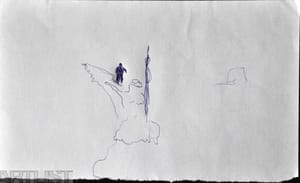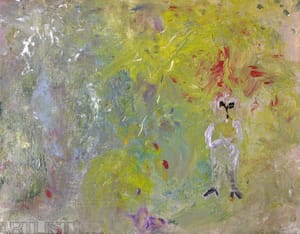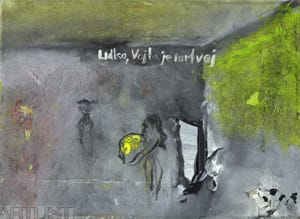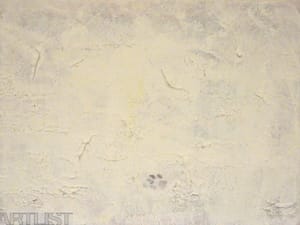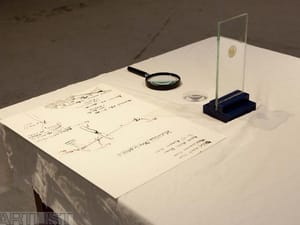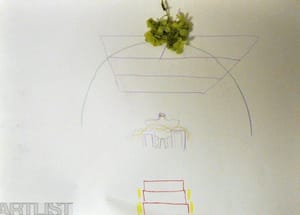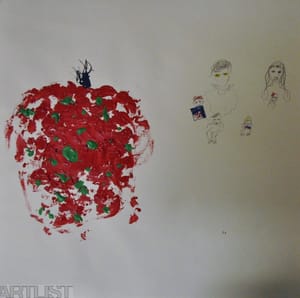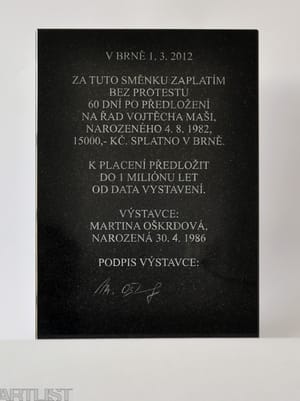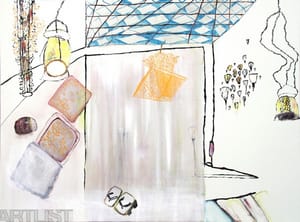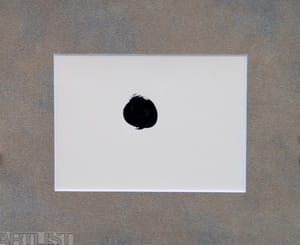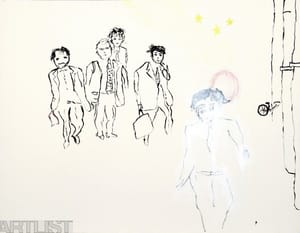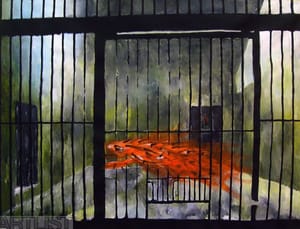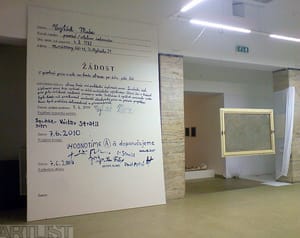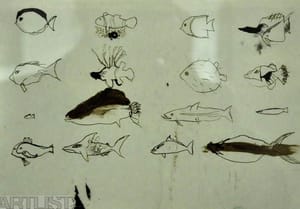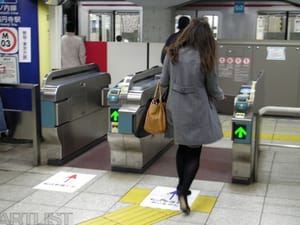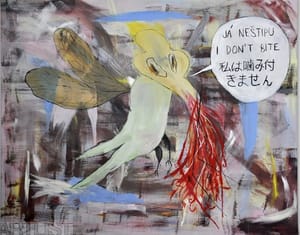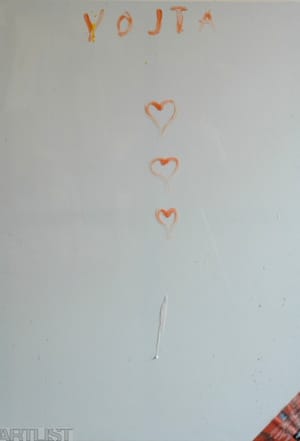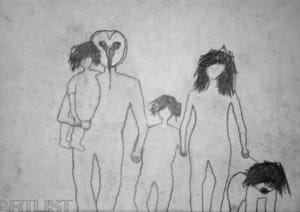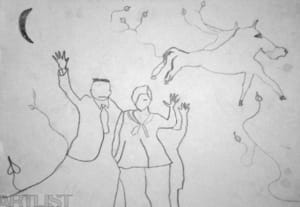- First Name
- Vojtěch
- Surname
- Maša
- Born
- 1982
- Birth place
- Brno
- Place of work
- Brno
- Website
- www.vojtechmasa.com
- CSU Library
- ↳ Find in the catalogue
About artist
Vojtěch Maša came to the attention of the general public mainly thanks to winning the EXIT award in 2013, when he awarded himself the Nobel Prize he had always coveted. “(…) ever since leaving school it had been my ambition to win the Nobel Prize for physiology or medicine. Later I quit the path of science. But I still could never quite accept that I would never receive the Nobel Prize. By creating my own Nobel Prize I am bringing this chapter of my life to an end and will be able to continue my work undisturbed.” This example speaks volumes both of the way he thinks about and approaches art, as well as the circumstances surrounding his life and studies that have influenced his work. “Unchained Maša”, as the art critic and curator Jiří Ptáček once described this young artist, in addition to his training in art that he received in Brno at the Intermedia Studio led by Václav Stratil, is also a mathematical biologist. This is reflected in the content of his work and, in some respects, in his methodology. Perhaps thanks to his scientific background, he approaches the act of creation with almost a child’s enthusiasm, combined with foresight and wit. There is a seriousness and sensitivity that makes of his work a kind of testimony, as well as a certain carelessness and insight that, on the other hand, offers a critical and thoughtful commentary on the events surrounding him. This seemingly naive critique relates, inter alia, to the art world and its values, and could be called a kind of subtle or sensitive satire. These two currents operate independently in his work. The sensitive component is to be found mostly in his drawings and paintings, while the critical and satirical more in his events and projects. However, in many cases they interact and intersect.
Maša most often expresses himself through drawing and painting. In addition to Brno, he also studied at art schools in Ljubljana (2007–08), Tokyo (2010), and at the Painting Studio in Zagreb, Croatia (2011). In addition, the influence of Japanese culture and its idiosyncratic creative elements (illustration, abbreviation, etc.) is also clear in his work. In several paintings and drawings, especially the early works, he lays an emphasis on craftsmanship and a realist conception of the canvas. However, later he inclines more to a symbolic and expressive rendition that becomes characteristic of his work. In terms of a certain clumsiness and imperfection, his work has something in common with children’s work or Art Brut. However, they are more sober and often contain a humorous subtext. The subject matter and themes are always related to the artist’s lived experience or memories, and are therefore very diverse. He occasionally inserts text into his images, which creates an impression of comics. The drawings have the character of sketches or maquettes scribbled carelessly into a notebook, or give the impression of being visual aide-mémoires that are more or less decipherable and legible. Maša captures intense visual and emotional perceptions and stimuli, as in the case of a series of drawings inspired by a trip to Japan, or in drawings that, according to the artist, are supposed to accompany (as a kind of soundtrack) a particular film, which were also on display at the exhibition Tak daleko, tak blízko (So Far, So Near) at the Jelení Gallery (2015).
Another level of Maša’s work involves projects and happenings of various kinds, which either react to a specific event, critique and seek to overthrow a particular system, or interrogate supposedly set rules. They all have a kind of purposeful naivety and charm of their own. One of them is the Nobel Prize referred to above, which was accompanied by a series of drawings and, finally, the award itself. The fact that some resulting artefact remains in the wake of an event that often interrogates the status and value of the work of art itself is characteristic of Maša’s approach. A case in point is the painting Velká žádost / The Great Application (2010), which he presented at the defence of his dissertation at the Brno Faculty of Fine Arts and which is both a painting (artwork) measuring 400 x 270 cm and equally valid official application form. The application in question relates to permission to work on this painting for the duration of his studies. It was signed and approved by all members of the exam board, after which it was signed though not approved by the dean. Another interesting project that showcases Maša’s entrepreneurial spirit is the firm Delegated Concepts, which is where his business activities are based and whose services include the sale of artistic ideas and concepts. When introducing the company, the artist said: “(…) a huge difference between this project and the simple sale of art is that I sell the entire idea to the customer, including copyright. The person who purchases the idea has the right to use the idea as their own. In that sense I want to underscore the problem of the authorship of all artworks.” Several of Maša’s other projects could be deemed public art. Worth mentioning in this respect would be Tokyo-Metro (2010), in which Maša conducted a kind of sociological survey in the metro during which passengers stated whether they were happy or sad in accordance with arrows and inscriptions in front of turnstiles. The results (213 happy and 103 sad) caused Maša such concern that he wrote a letter to the Japanese emperor.
Despite this multiplicity of themes, modes of expression and creative methodologies, Vojtěch Maša has his own unique style, notwithstanding (or perhaps because of) the fact that he himself has attempted to interrogate the very concept of originality, an enterprise he is far from being the first to attempt. However, even in this deconstructive endeavour Maša remains highly idiosyncratic for the reasons enumerated above. At present he is one of the most prominent young artists on the Brno and broader art scene, and we can only be curious as to what direction his work will take in the future.
- Author of the annotation
- Alžběta Cibulková
- Published
- 2015
CV
2011 Academy of Fine Arts, Zagreb, Croatia Studio of Painting, Head: prof. Igor Rončević
2010 Asagaya College of Fine Arts and Design, Tokyo, Japan Studio Image Creation, Head: Yukio Fukuda
2009 - now (2015) Faculty of Fine Arts of Technical University in Brno, Studio of intermedia, doc. Stratil
2007 - 2008 Academy of Fine Arts in Ljubljana Studio Painting, prof. Gustav Gnamuš
2005 - 2009 Faculty of Science, Masaryk University, Mathematical Biology
2002 - 2009 Faculty of Science, Masaryk University, Graphic Design and Creative Informatics
1993 - 2002 Episcopal Grammar School Brno
internships, creative residencies:
2011 Artist in Residence in the Grounds of Zenko-ji Temple, Nagano, Japan
Exhibitions
- Solo exhibitions
-
2015
Lipánek (host Yumi Yahiro), Galerie W7, Olomouc
Steve Hawking/Tak daleko, tak blízko, Galerie Jelení, Praha
Suši/Swimming in love, Galerie Krása, Brno
2014
Nobelova cena, Galerie Kostka, Meet Factory, Praha
2013
Exemplární druh, Galerie mladých, TIC, Brno
2012
Klaunovy názory, Galerie Umakart, Brno
Ježek (zajíc), Galerie Dobrý den, Uničov
2011
Poetry Hunter, Hanagura Gallery, Nagano, Japonsko
2010
Umělá žena, Galerie 12, Zlín
2009
A little bit of this, a little bit of that, Studio Lávka Lužánky, Brno
2008
Trinajsta soba, Café Pilon, Lublaň, Slovinsko
Everything is alright, BI-KO-FE, Lublaň, Slovinsko
2007
Sarko facho!, Žlutá galerie FSS MU, Brno
- Group exhibitions not included in ARTLIST.
-
2013
Cena EXIT 2013, Galerie Emila Filly, Ústí nad Labem
Hi5!, Dům umění města Brna, Brno
2012
Zkušební vrty, Galerie G99, Dům umění města Brna, Brno
VI. Zlínský salon mladých, Dům umění ve Zlíně, Zlínský zámek
Perly sviním, Galerie AVU, Praha
2011
Neue Kroatische Kunst, Medica, Záhřeb, Chorvatsko
2010
Finalisté – Cena 333 NG a Skupiny ČEZ, Národní galerie v Praze, Veletržní palác, Praha
Juliette Mallet & Vojtěch Maša, Asagaya College of Fine Arts and Design, Tokio, Japonsko
Ontogenie, Zbrojovka factory, Brno
10 let, Absolventi Ateliéru grafického designu a multimédií FI MU Brno, Galerie BKC Kabinet, Brno
Art plenér 010 Galerie Bernarda Bolzana, Těchobuz
Haťapaťa, výstava ateliéru Intermédia FAVU Galerie 12, Zlín
2009
Výstava nominovaných na ESSL AWARD, Lublaňský hrad, Lublaň, Slovinsko
2008
Preboj mladih (Souboj mladých) Galerija Severia, Koper, Slovinsko
XIX. plenér Akademie výtvarných umění v Lublani, Městská galerie Velenje, Slovinsko, Lublaňský hrad, Lublaň, Slovinsko
2007
1.3 festival nových médií v Lublani Městská galerie Lublaň, Slovinsko
2006
Výstava učitelů a studentů Ateliéru grafického designu a multimedií FI MU Galerie Milana Zezuly, Městské divadlo, Brno
- Collections
-
Galerie Severija (Koper, Slovinsko)
Městská galerie Velenje (Slovinsko)
Monography
- Monography
Jiří Ptáček: VI. Zlínský salon mladých, katalog k výstavě, 2012
- Articles
Alžběta Cibulková: Vojtěch Maša- Chtějí teorii všeho, Artalk.cz, 2015
Lenka Sýkorová: „Nobelova cena“ pro Vojtěcha Mašu, Artalk.cz, 2014
Jiří Ptáček: Nespoutaný Maša, Nový prostor 420/2013
- Personal texts not included in database
Vojtěch Maša: Nobelova cena, text v katalogu Ceny EXIT 2013
